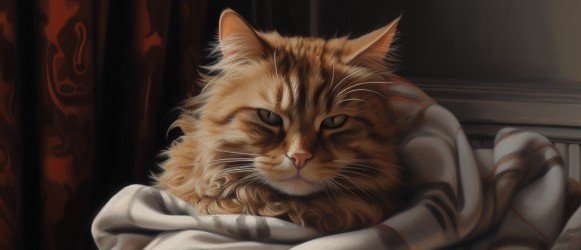Can cats get colds?
The term 'common cold' refers to a group of viruses that cause cold symptoms in humans. While cats can’t catch these particular viruses, they can still get affected by two feline viruses known as feline herpesvirus and feline calicivirus, which cause cold-like symptoms and can result in serious illness.
The main symptoms of a cat cold are sneezing, coughing, and a runny nose and eyes. To help prevent colds in cats, you should ensure they're vaccinated against those two viruses. Cats and humans can't give each other colds because different viruses cause them, but cat viruses are highly contagious to other cats and can spread rapidly.
Main takeaways
- Cats cannot catch colds from humans and vice versa
- Caused by viruses like feline herpesvirus and calicivirus, cold symptoms in cats include sneezing and runny nose
- Cats catch colds through droplets in air, direct contact, and shared items, and stress can increase susceptibility
- Treatment may include medication, supportive care, and keeping your cat comfortable at home
- Regular vaccinations, good hygiene, and stress reduction can help prevent cat colds
What is a cat cold?
Cat colds are upper respiratory infections (URI), also known as ‘cat flu’. It’s believed feline calicivirus is responsible for around 40-50% of URIs, while feline herpesvirus accounts for about 30-40%. These common viruses can cause symptoms ranging from mild to severe.
A less common cause of cat colds is a bacterium called Chlamydophila felis. This can lead to conjunctivitis and mild respiratory issues.
How do cats catch colds
Cats get colds in the same way humans do. The viruses spread through the air in droplets when an infected cat sneezes or coughs. They can also be passed on through direct contact with infected saliva or nasal and eye secretions, usually when cats cuddle or groom each other. The viruses can also be caught from shared items such as food bowls or bedding.
It’s worth noting that stress can weaken your cat's immune system, making them more susceptible to catching colds. This can happen due to changes in the cat's routine, other illnesses, or a new environment.
Cat cold symptoms
When your cat catches a cold, there are several symptoms you might notice.
- Sneezing
- Runny nose
- Watery eyes
- Coughing
- Fever
- Lethargy
- Loss of appetite
If you have a cat with a mild cold, keep them warm and rested, tempt them to eat and monitor their symptoms closely. If you notice they're not getting better after a few days, or their symptoms are getting worse, you should take them to the vet. Respiratory viruses can cause serious illness.
When should I see my vet?
While most cat colds resolve by themselves, there are times when you should be more concerned. If your cat shows any of the following signs, contact your vet.
- Difficulty breathing, which may show as breathing faster, breathing with the mouth open, or more effort when breathing (tummy sucking in and out).
- Not eating for more than a day
- Unusual lethargy
- Persistent symptoms
Just like with people, older cats, kittens, and cats with underlying health conditions are more vulnerable to the effects of a cold. If your cat falls into any of these categories, take them to the vet as soon as possible. This is especially true if your cat hasn't been vaccinated.
Finally, if you notice that your cat is coughing, having trouble breathing (especially breathing with their mouth open), or not eating, take them to the vet immediately. These can be signs of a more serious condition that needs to be treated promptly.
Treating a cat cold
When you take your cat to the vet, they will assess the severity of the cold and decide on the best course of action. Treatment might include:
Medication
If the cold is caused by bacteria, your vet might prescribe antibiotics. Remember, most cat colds are caused by viruses, and antibiotics don't work on viruses. Cats with severe viral infections may need special anti-viral drugs to combat the infection. Your vet may prescribe medication to relieve your cat’s symptoms, such as anti-inflammatories.
Supportive care
This can include fluids to keep your cat hydrated, especially if they're not eating or drinking enough.
Nebulisation
In some cases, vets use a nebuliser to help ease breathing difficulties. It's like a little steam room for your cat, helping to clear their airways.
How can I treat my cat's cold at home?
Keep them warm and comfortable
A cosy, quiet spot free from draughts can help your cat rest and recover.
Ensure they stay hydrated and eating
Encourage your cat to drink water. You can try giving them wet food with added water, or a little chicken broth (without onions or garlic) to increase fluid intake. Adding the water from a can of tuna may encourage them to drink more.Cats with runny noses often go off their food, as cats rely so highly on their sense of smell around food. Try tempting them to eat with moist and smelly foods such as meaty or fishy pastes and pates, and warming the food gently first can help enhance the smell.
Gentle cleaning
If your cat has a runny nose or eyes, gently wipe the affected area with a soft, damp cloth.
Limit stress
Keep your home environment calm and stress-free. Avoid loud noises or sudden changes and make sure your cat has space away from other cats if they live in a multi-cat household. When this can’t be helped, like in the case of a new baby or building work, creating a calm, private and quiet space for your cat can help.
Isolation from other pets
If you have other cats, it’s sensible to separate them to prevent the virus from spreading. Use separate feeding bowls, bedding, grooming equipment and litter trays and practise good hand hygiene.

Preventing colds in cats
Preventing cat colds is all about taking proactive steps to keep your cat healthy and reduce their risk of infection. Here are some key ways to help protect your cat from catching a cold.
Vaccination
Regular vaccinations are crucial. They help protect your cat against the feline herpesvirus and calicivirus. You can significantly reduce the cost of vaccinations and other preventative treatments by joining Pet Health Club.
Good hygiene
Keeping your cat's living area clean can also reduce the risk of infection. Regularly clean their food and water bowls, litter box, and bedding.
Limit exposure to sick cats
If you know a cat is unwell, try to keep your cat away from them. This is especially important in multi-cat households or if your cat goes outside.
Stress reduction
Stress can weaken a cat's immune system, making them more susceptible to colds. Try to maintain a calm and stable environment for your cat. This includes regular playtime, a consistent routine, and a quiet place for them to retreat to.
Balanced diet
A healthy diet is key to a strong immune system. Ensure your cat eats a balanced diet suitable for their age, health status, and lifestyle.
Regular vet check-ups
Regular visits to the vet for check-ups can help catch and prevent health issues before they become serious. This is another benefit of joining a preventative healthcare plan like Pet Health Club.
What’s the difference between cat colds and cat flu?
The term "cold" is a bit of a misnomer since these infections are not caused by exposure to cold weather but by viruses and bacteria. Cat colds and cat flu are effectively interchangeable terms used for upper respiratory infections caused by feline herpesvirus and feline calicivirus. However, the terms “cat flu” and “feline influenza” are typically used when cats suffer from more severe symptoms.
.png)
Frequently asked questions about cat colds
Can cats catch colds from humans?
No, cats can't catch colds from humans. Cat colds are caused by different viruses that cause human colds.
How long does a cat cold last?
A typical cat cold lasts about 7-10 days. However, if your cat's symptoms don't improve within this time or get worse, you should contact your vet.
Can cat colds be prevented?
While you can't completely prevent cat colds, regular vaccinations, good hygiene, and reducing stress can significantly lower the risk.
Is it safe to give my cat human cold medicine?
No, never give your cat medication intended for humans. Many human medicines (including those for children) are toxic to cats. Always consult your vet before giving any medication.
Can cat colds lead to more serious conditions?
Yes. A cold can lead to more serious respiratory problems, especially in kittens or older cats. Contact your vet immediately if you notice any severe symptoms like difficulty breathing.
Do indoor cats get colds?
Yes, indoor cats can get colds, although they're less likely to than outdoor cats. Keeping their living environment clean and stress-free helps reduce the risk.
How can I tell if it's a cold or something more serious?
If your cat has mild symptoms like sneezing or a runny nose, it's likely a cold. However, if they have trouble breathing, stop eating, or seem very lethargic, it could be something more serious. When in doubt, always consult your vet.

Need more advice on can cats get colds?
If you’re concerned about your cat catching a cold, speak to your local vet or vet nurse.
Find your nearest vet using our find a vet page, or speak to one of our vets online using our video vets service.


